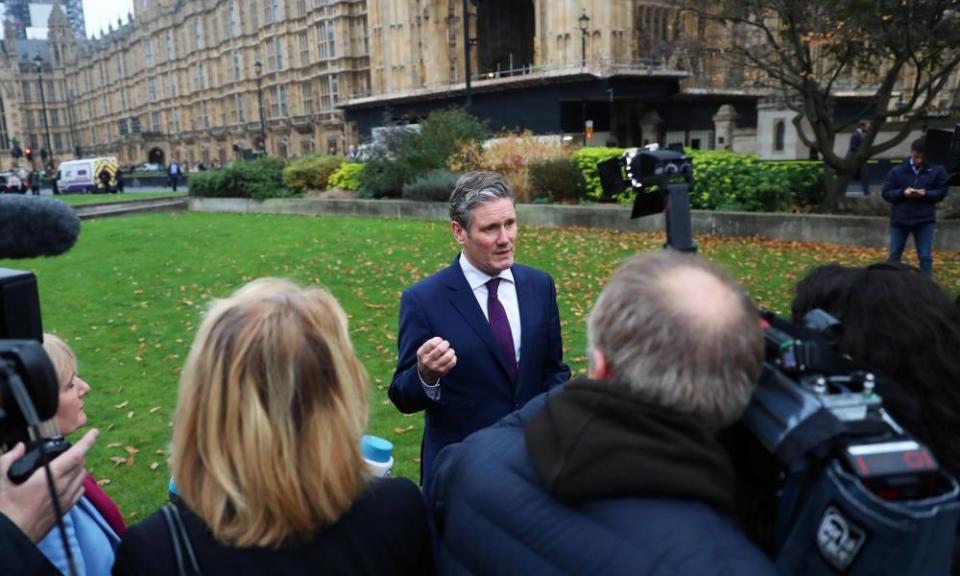Labour: May should spell out contingency in case Brexit deal fails

Labour will press Theresa May to spell out how she is going to avoid a high-risk no-deal Brexit, arguing that the hostility from MPs since her final deal was unveiled demonstrates that she cannot get her plans through the Commons.
Sir Keir Starmer said that Labour’s opposition to May’s plans had hardened in the 24 hours since they were published, and with so many Tories insisting they would rebel, the prime minister had to be forced to consider alternatives.
Labour’s Brexit spokesman said: “What we are going to start asking is ‘what prime minister is your contingency plan?’ to avoid a no-deal disaster in the event it goes down. There has to be another way.”
Starmer wants Labour to find a mechanism by which MPs could intervene and force the prime minister to soften her position if her Brexit deal is voted down, although it is not clear what could be renegotiated with the European Union in the time left available.
Senior Labour figures agreed on Wednesday night that May’s deal had failed the party’s six tests, meaning that the party’s leadership would definitely whip its MPs to vote against the deal when it comes before the Commons next month.
Jeremy Corbyn went public with the party’s hardened position on Thursday morning, when he spoke in the Commons after May: “After two years of bungled negotiations, the government has produced a botched deal that breaches the prime minister’s own red lines and does not meet our six tests.”
Starmer said he thought there was zero prospect of Labour being able to work with May to achieve a softer Brexit, because the prime minister would never sign up to the opposition’s demand to remain in a permanent customs union with the EU.
“They haven’t been reaching out. There’s an unbridgeable gap,” Starmer said. “It would split their party.”
But Labour believes that a majority of MPs would support a soft Brexit instead of crashing out of the EU without a deal, if they could find a way of working with Tory remainers.
Downing Street has been hoping to win over some Labour MPs to support May’s final deal, with the argument that they should consider doing so in “the national interest” because the alternative, no deal, is so much worse.
There have been signs that Labour support is hardening against May, with MPs who have voted with the government on Brexit such as Kate Hoey and Graham Stringer amongst those who have in the last couple of days indicated they would be very unlikely to prop up the Conservatives.
However, Caroline Flint, another former minister, said again on Thursday that she would consider voting with the government, unless there are safeguards against a no-deal Brexit: “It’s hard to focus on the deal when the government is imploding. But my biggest fear is still events leading to the UK leaving with no deal.”
MPs harbouring reservations like Flint, however, will be targeted by a new campaign – Vote Down the Deal – launched by party activist group Momentum.
A special website, complete with a fundraising drive and a series of videos criticising May’s deal, will help Labour party members petition their MP. It will be accompanied by a parallel lobbying effort aimed at persuading other MPs at Westminster to vote against the deal.
Many Labour members were angered when a handful of MPs, including Hoey, Stringer and Frank Field – who has since left Labour – voted with the government on a series of amendments to the customs and trade bills which passed by only a handful of votes.
Labour’s Brexit policy, carefully crafted at its annual conference in September, said that the party would evaluate May’s final deal and if it was voted down, the party would push for a general election. Failing that, the party said that it would consider all other options, including a second referendum.
Few, however, believe that it will be possible to win a no-confidence vote and force a general election. “The notion of an early election is not credible as so far not a single Tory or DUP would vote for it,” said one Labour MP who wants the party to back an immediate second referendum.
Labour MPs who support a second referendum, though, say that because there are a rising number of Tories who would support another national vote, that would be the most likely way to reverse Brexit.

 Yahoo News
Yahoo News 